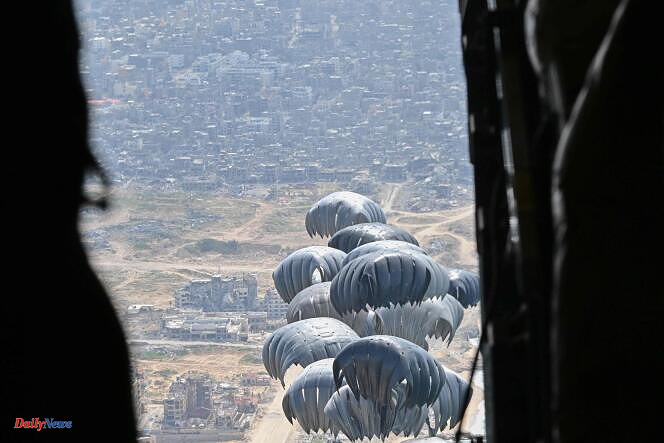The war between Israel and Hamas has left 31,988 dead in the Gaza Strip, mostly civilians, according to a report released Thursday March 21 by the Palestinian Islamist movement's health ministry. On the Israeli side, around 1,160 people died – most of them also civilians – during the Hamas attack on October 7, 2023, according to a count from Agence France-Presse (AFP), established in from official Israeli sources. Additionally, according to the Israeli army, 594 soldiers were killed in fighting in the Gaza Strip.
Egypt, Qatar, Saudi Arabia, Jordan and the United Arab Emirates participated in a ministerial meeting on the war in Gaza on Thursday in Cairo. In a joint statement, participants called for “a complete and immediate ceasefire” and “the opening of all crossing points” into Gaza, where aid is only trickling in.
In addition to the foreign ministers of these five countries, Hussein Al-Sheikh, a senior official of the Palestinian Authority in the occupied West Bank, close to Palestinian President Mahmoud Abbas, also took part in the meeting.
Later, they will meet US Secretary of State Antony Blinken, who ruled on Thursday that a major Israeli operation in Rafah – home to nearly 1.5 million displaced Palestinians in southern Gaza – would be “a mistake” when a truce agreement is “possible.” Mr. Blinken also said on Wednesday that the United States had presented a draft resolution to the UN Security Council calling for an “immediate ceasefire linked to the release of the hostages”. So far, the United States, Israel's main ally, has vetoed several resolutions calling for ceasefires. But with nearly 32,000 dead in Gaza, according to Hamas, and the risk of famine in the besieged Palestinian territory, the United States says it is redoubling its efforts for a truce.
At the same time, the head of the Israeli intelligence service (Mossad), David Barnea, will travel to Doha on Friday to meet with the head of the CIA, William Burns, as part of negotiations for a truce in Gaza, the office announced on Thursday. of the Israeli Prime Minister. He will also meet the Qatari prime minister and the head of the Egyptian intelligence service, other mediators in the negotiations.
Paris announced Thursday at the UN that it was working on a draft resolution calling for an “immediate ceasefire” in Gaza. “We consider that it is time to take new initiatives at the United Nations Security Council on the ongoing conflict,” underlined Christophe Lemoine, deputy spokesperson for the Ministry of Foreign Affairs. He specified that the head of French diplomacy, Stéphane Séjourné, had spoken on Wednesday with his Algerian, Egyptian, Jordanian and Palestinian counterparts.
Mr. Lemoine was not able to specify when this draft could be tabled but, according to him, it “could obtain the agreement of the Security Council”, unlike the draft resolutions previously tabled by France. The spokesperson for the Quai d’Orsay also brushed aside any lack of coordination with Washington. “Obviously, we have been coordinating with the United States since the start of the crisis,” he assured.
Cyprus hosted a meeting on Thursday focused on ways to send, via a maritime humanitarian corridor, “as many boats as possible” loaded with supplies to Gaza, Foreign Minister Constantinos Kombos said. Representatives from 36 countries, UN agencies and humanitarian organizations attended the meeting.
A first ship, containing 200 tons of food, arrived on March 15 on the coast of the besieged Palestinian territory after three days of navigation. A second boat is waiting for favorable weather to be able to set sail from Larnaca.
According to the UN, the vast majority of the Gaza Strip's 2.4 million residents are at risk of famine. The situation is particularly serious for 300,000 people in the north of the enclave, where the delivery of aid is particularly dangerous.
Faced with the insufficient aid arriving by land, parcel airdrop operations have been underway for two weeks. But sending aid by sea or air cannot replace land delivery, insists the UN.
The Houthis have been behind at least fifty attacks on ships off the coast of Yemen since the fall, Deputy Defense Secretary Celeste Wallander said in Washington on Thursday. The rebel group, supported by Iran, has been carrying out attacks on ships it considers linked to Israel since November, claiming to act in solidarity with the Palestinians in Gaza.
The Houthi attacks have largely disrupted international maritime trade, of which passage through the Red Sea and the Suez Canal is an essential route. Faced with this, the United States set up a multinational maritime protection force in the Red Sea in December and launched, with the help of the United Kingdom, strikes in Yemen against the Houthis.












